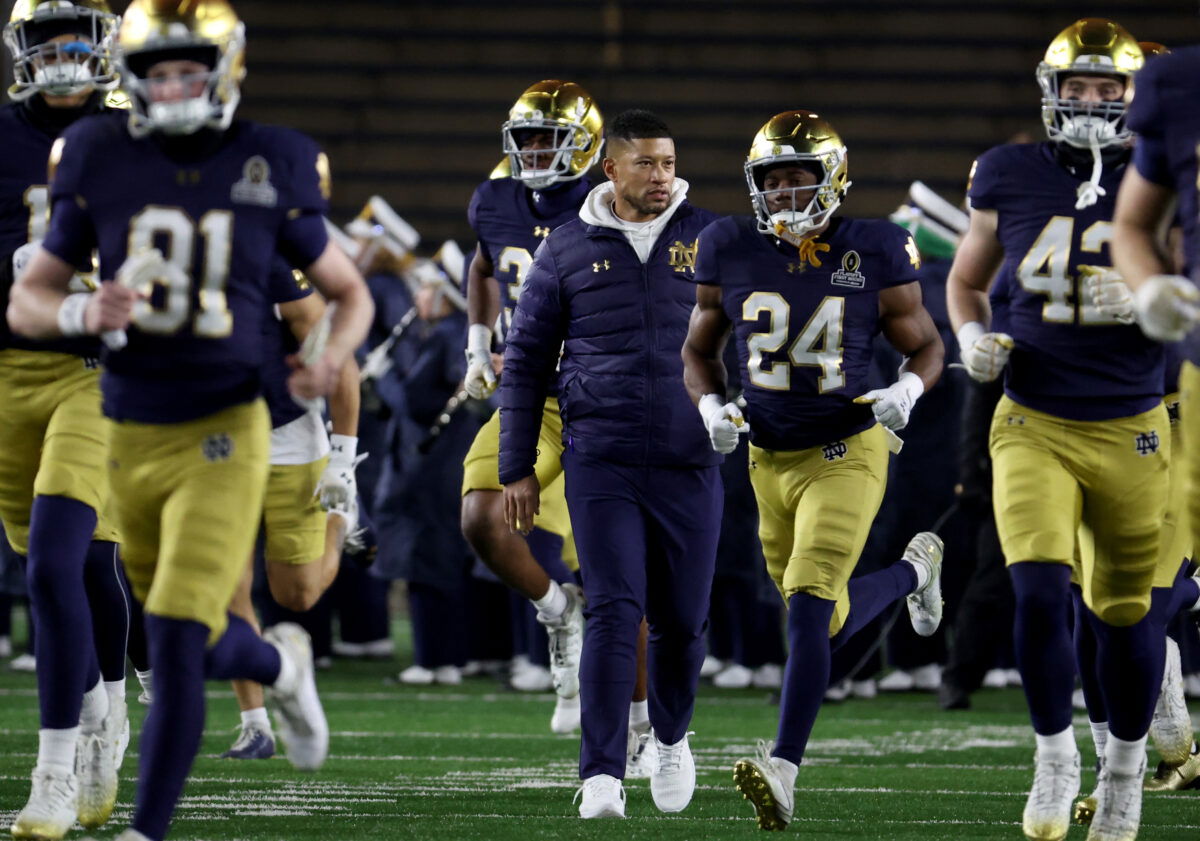
Imago
Dec 20, 2024; Notre Dame, Indiana, USA; Notre Dame Fighting Irish head coach Marcus Freeman leads the team onto the field before a first round playoff game against the Indiana Hoosiers at Notre Dame Stadium. Mandatory Credit: Trevor Ruszkowski-Imagn Images

Imago
Dec 20, 2024; Notre Dame, Indiana, USA; Notre Dame Fighting Irish head coach Marcus Freeman leads the team onto the field before a first round playoff game against the Indiana Hoosiers at Notre Dame Stadium. Mandatory Credit: Trevor Ruszkowski-Imagn Images
Essentials Inside The Story
- Notre Dame Heisman finalist breaks down sign-stealing conundrum
- Revisiting the infamous Michigan scandal that broke college football
- CFB coaches gather around to give views on sign-stealing issue
Everyone’s aware of the sign-stealing debate between two CFB heavyweights: Ole Miss’s Lane Kiffin and Oklahoma’s Brent Venables. However, that engrossing debate now seems to have concluded, thanks to former Notre Dame quarterback Brady Quinn’s perspective on sign-stealing.
Watch What’s Trending Now!
“I had heard about this forever ago, because even when you’re a backup quarterback, and you’re on the sideline, you’re trying to steal signals during a game, said Quinn on Wednesday’s appearance on the Dan Patrick Show.
That’s part of the game. If I know that we can shift your motion as an offense to something and I can dictate or predict what your coverage is, of course, you’re going to steal every sign possible, whether it’s from the sideline or from the player.”
In short, during a game, watching the opponent’s signals and legally decoding them becomes a part of standard in-game strategy. Those words of the Notre Dame Heisman finalist carry weight. At Notre Dame, as a four-year starter, Quinn set 36 single-season and career records for the Irish, including an impressive 11,762 career passing yards. So he knows what it takes to win a game.
With that level of talent, the former Notre Dame QB seems no stranger to sign-stealing during his playing days. As he joked that defensive guys “aren’t always the sharpest tools in the shed,” he made it clear that sign-stealing becomes an advantage when it helps swing a play in a team’s favor.
“Of course, we’re going to use that to our advantage,” said Quinn.
But there’s a twist.
While his experience fell within the normal bounds of the game, Michigan staffer Connor Stallions’ operation crossed the line and ultimately cost the program heavily. Stallions received an eight-year show-cause order. Michigan received a hefty fine of up $30 million along with an additional $50,000, plus 10% of the football program’s budget, and was placed on probation for four years.
View this post on Instagram
Here, keep in mind that whatever Quinn said is a whole different beast from the Michigan–Connor Stallions scandal. Stallions bought tickets to more than 30 games to record opponents’ signals, and he even paid others to help. So that wasn’t sideline savvy; that was full-blown espionage.
Still, Quinn believes sign-stealing continues in college football.
“The whole sign-stealing thing with Connor Stallions in Michigan, to me, was a Pandora’s box that no one really wanted to open, because there were a lot of teams doing it,” said the former Notre Dame QB.
Then came the truth behind that scandal.
“I think since Connor Stallions has left, and he’s been more emboldened to talk about it, you know, he’s trading this information with other teams, and they were willing to trade with him.”
Here, Quinn called sign-stealing an open secret, but college football refuses to confront it. In his view, there’s a simple fix.
“They needed coach-to-quarterback communication probably a long time ago,” said Quinn.
If the play goes straight into the helmet, there’s no need for a sideline circus of signals. Only in hurry-up situations or quick checks at the line would teams rely on hand signs. Now, while Quinn argues modern CFB needs modern communication, the bigger question remains:
Is sign-stealing actually legal? The ongoing CFB debate may provide the best answer.
CFB coaches’ take on sign-stealing
Earlier this year, Lane Kiffin hinted the Sooners were masters at “stealing signs,” before softening it to the friendlier term “information gathering.” With Oklahoma vs. Alabama thrown into that mix, Alabama OC Ryan Grubb had already confirmed the Tide wouldn’t be flashing the same signals this time around.
“They’re good at that and we’re changing everything, said Grubb. He even tossed in a playful warning: If Coach Venables is listening, just know they’re all changing.”
Here’s the key point: it’s all legal. While Oklahoma isn’t pulling a Michigan-style covert operation, they’re simply elite at reading tendencies.
Here, Kiffin praised, stating, “Film study of signals. They do a great job of that.”
Although the Ole Miss HC even told Hugh Freeze that it looked like Brent Venables had Auburn’s signals during their matchup, he quickly clarified the intent. Then there’s Alabama coach Kalen DeBoer, who said the quiet part out loud.
“Across the country, there’s some element of every team doing something,” he said.
Simply put, the trick is to adapt, mix tempos, and change signs before anyone cracks the code. Hence, it’s considered fair in college football, with no illegal involvement.
.png)
.png)
.png)





